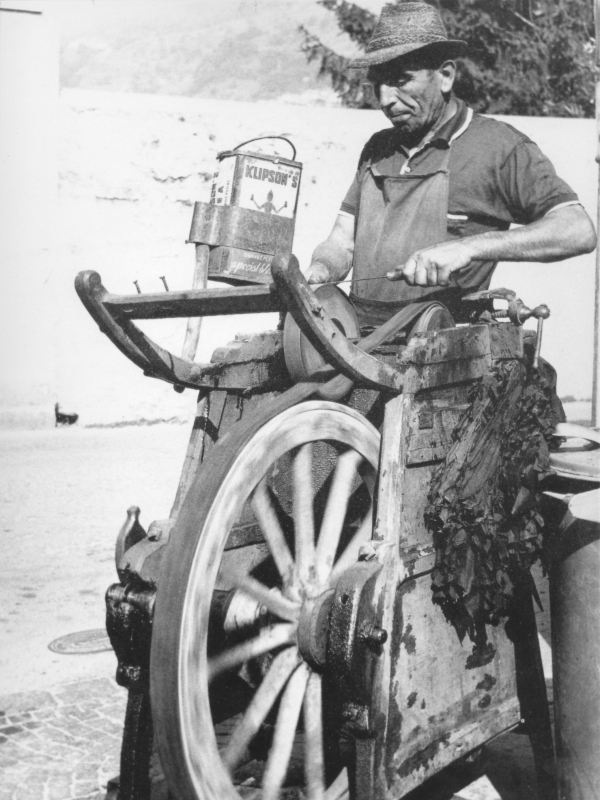The knife grinder's trade (el muléta, in local dialect) in the Valmalenco and in the province of Sondrio had always been the privilege of the inhabitants of Caspoggio who, in the past, had been forced to emigrate from the village to make up the meagre resources they gained from exploiting the land and pastures.
They specialised in this craft which, until a few decades ago, had continued to be much in demand.
 The "muléta", Andrea Negrini.
The "muléta", Andrea Negrini.
After 1878, when
Comune di Caspoggio
the roads linking the village to Chiesa and to Sondrio were built, the activity of the
muléta increased considerably, as it was easy for the knife grinders to emigrate and work as street tradesmen not only throughout the province, but also further afield.
Some went towards the Po Valley and to parts of Piedmont and Emilia Romagna, others went as far as Naples.
After a few decades, almost all the men from Caspoggio were doing this job.
When work in the countryside came to a halt, they took their cart, called
möla and walked short stretches at a time to where there was work, stopping every so often to sharpen some cutting instrument.
Each one of them had his own area and the grinder usually brought a boy with him.
This was usually his son or a family member, who went looking for the tools to grind shouting
“molìta, l’è chi ‘l molita!” along the village streets.
He would collect the tools, take them to the grinder, who usually set himself up in the village square, and then took them back to their owners to receive payment in money or, more often, in products from the land: wheat, wine, chestnuts, cheese and salame.
 The "muléta", Isidoro Negrini.
The "muléta", Isidoro Negrini.
The muléta
rarely returned home except for official festivities, such as Christmas, Easter, San Rocco, the patron saint of Caspoggio, the day of the Dead, and for the first and second haymaking, or for the birth of a child or the death of a relation.
It was a wretched life: working on the streets without a fixed abode, they slept where they could, in a cattle shed or barn, inside a cloth sack
(sak da muc’).
They would wash in the public fountain, they almost always ate a piece of dry bread and cheese, and on rare occasions had a warm meal in some inn.
Always forced to walk on foot, they were exposed to all weathers, pushing their grindstone on unmade or mountain roads, balancing all day long on their left foot, and pushing the pedal with their right foot to turn the grindstone wheel.